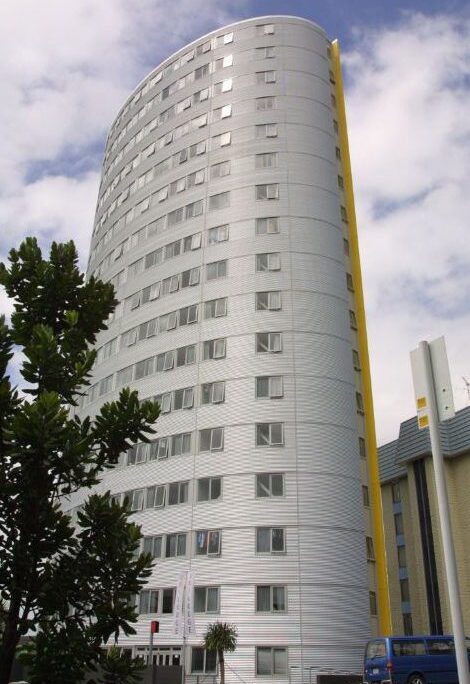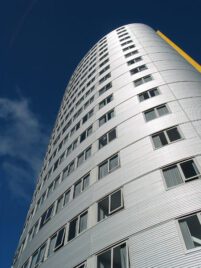Auckland developer Nigel McKenna has fostered a winning partnership with student lodge operator UniLodge, which will also be the manager of the second 159-unit multi-level complex he is completing near the universities.
A developer who has specialised in residential apartment market in Wellington and Auckland, McKenna and his staff at Melview Developments began researching ways to tap into the university student accommodation sector in 1990s, culminating in the development of the architecturally distinctive UniLodge on Anzac on Auckland’s Anzac Ave that has been operating now for four years.
It is built on a former Railways leasehold site now owned by Tramco, which will retain the freehold interest. Melview has a perpetual lease.
“We like to think we understand the residential market whether its hotel, student accommodation or luxury apartments. We identify all the potential sectors so we viewed the UniLodge development as an extension of the residential market. From a project development perspective, UniLodge is like a hotel but without the room service.”
On a visit to Australia in the mid-1990s, McKenna “stumbled on” UniLodge, a company set up in the early 1990s by group of investors who had been involved in the hotel business.
UniLodge’s point of difference is that it specialises in the kind of managed facilities and pastoral care specific to the university and polytechnic market. Management staff, visible by their uniforms, are on duty around the clock and psychological counselling is always available.
The company has about 4000 beds under management, mostly in Australia, with one operating in New Zealand and two more under construction in Auckland and Christchurch – including McKenna’s second market offering – UniLodge on Beach (Rd), on a site overlooked by, and backing onto, UniLodge on Anzac.
Subtle Monitoring: The UniLodge building was specifically designed with the needs of students in mind – or put another way, the most effective ways of managing them and keeping them safe. For example, whenever students enter the building they must go past reception. “That’s no mistake. It’s a subtle form of monitoring,” McKenna says.
Many overseas students may find university a stressful time with high family expectations, and many are not wealthy. So it’s important that their environment is designed to help them adjust.
One of the communal areas at UniLodge on Anzac is the ground floor kitchen.
The students also have cooking facilities in their rooms but after the first few weeks the community dynamics come into play and the students use the communal facilities more, some of them joining together to share the shopping and cooking.
“It’s not like a flat. Students do their own daily cleaning of rooms but management staff monitor the situation and carry out a more extensive clean up at the end of each semester to maintain the property at a level similar to a hotel. We have a cleaning service that overseas the building,” says McKenna.
One of the biggest draw cards is the security that is provided, both in the design of the building (with residents and guests leaving and entering via the same reception rather than back doors) and the on-site manager. On-site facilities include a pool, barbecue area, kitchen and dining areas, reception and meeting rooms. Close proximity to the university campus and downtown shopping is another significant attraction for students who want to be within walking distance of city amenities.
Competitive Market: The UniLodge brand has become well known internationally and about 80% of students come from overseas.
UniLodge on Anzac was nearly fully booked this year, weeks before the first semester.
“It’s a competitive market but the design and brand of UniLodge on Anzac gives it a point of difference. There are few developments in Auckland that I would call true student accommodation buildings. There are quite a few that get built and people say they are obviously student flats – but just because the rooms are small doesn’t constitute good student accommodation.”
McKenna is a Property Council representative on the Auckland City Council panel whose job is to set guidelines on the size of inner city apartments as a result of controversy about small rooms and poor design. He says the size of student rooms is related to (and UniLodge rooms are relatively small) provision of common facilities and management of facilities and services when it comes to student accommodation.
Linked Buildings: Construction of the second Auckland UniLodge is well under way with completion due in time for the 2006 semester. Because the Beach Rd site is on a lower level than Anzac, an air bridge that will link the two buildings will extend from the top floor of UniLodge on Beach to the ground floor of UniLodge on Anzac.
The architectural appearance of the second UniLodge is more orthodox than the striking corrugated steel walls of the silo-shaped first one. From an operational point of view the development of the second UniLodge will also provide some economies of scale when it comes to servicing. For example, a part-time maintenance technician will have sufficient work to become full-time.
“It was demand driven. We’ve had 100% occupancy over the past two years and during February over the past two years we’ve had excess demand of about 100 units. We did a scoping study to decide the final shape and size.”
Communal Facilities: Floor plates in the new building are large. There is a large games room, television lounge, gymnasium, in-house movie theatre with foreign language films and sports as well as internet communication.
“There are the kind of facilities that make it student accommodation,” says McKenna.
“If they need help with orientation then UniLodge arranges walks around the city and nearby field trips, or they’ll help with things like getting driving licences. It takes a month or two to build a new community for the year. There are about four staff available from early morning and some of them speak multiple languages.
“It’s very secure and comforting, especially for young women.”
The most comparable student accommodation is the halls of residence operated by the Auckland University.
“That’s the nearest benchmark but they don’t usually have all the facilities. The university halls are the role model but we’re doing it from private perspective and we think we’ve raised the benchmark.”
McKenna says the University of Auckland and Auckland University of Technology (AUT) have been willing to recommend and make informal commitments to promote UniLodge.
“We could have approached them to do the management but we chose UniLodge.”
Tax Benefits: Students come from diverse countries including Korea, China, Singapore, India and Germany – as well as other parts of New Zealand. The ratio of females to males is usually about 50:50. Residents must be university students, rather than students of any other educational institution, for tax reasons.
“We’ve structured it as a student hostel and not many people know that the rental attracts GST at 7.5% for university accommodation. It’s a benefit we got formally approved in 1999 with the Inland Revenue Department.” The average stay is about nine months.
Students may take a lease for six months or 12 months and most of them opt for the six-month option initially and usually take out another contract for the second six months. Studio apartments are contracted at weekly rates of $205-255, one-bedroom units $310-$345 and, for students prepared to share 2-4 bedroom apartments with three to four others, rates range from $173 to $196 per week.
Pastoral Care: UniLodge Auckland general manager Paul Hesseling says the rates are comparable to university halls of residences and similar accommodation. “Its difficult to compare it to an unfurnished apartment though, because you’re not comparing apples to apples.”
Students need only bring their own linen, cutlery and crockery. They can get this “reasonably cheaply” and then take responsibility for it, along with cleaning their rooms.
“We have a vacuum cleaner that they can borrow,” says Hesseling. “I keep that in my office, so then they have to come and ask for it, which gives me a chance to see them all and see how they’re going. It’s all part of the pastoral care side of it.”
He likens the pastoral care to watching out for part of your family.
“It’s just being aware of what they’re doing, who’s in difficulties and who’s not, and then referring and getting them to the right place for any help they might need.
“Parents want this sort of security and the knowledge that someone is looking after their youngsters for them.”
Hesseling knows because many have rung and asked him to. “Certainly, if my kids were going somewhere off-shore, I’d want them to go to a place like this because somebody there would be keeping an eye on them.”
Keen Investors: Melview’s UniLodge on Anzac apartments have proved a sound investment with returns above forecast after the expiry of the three-year guaranteed return period. Melview offers guaranteed returns of 7% for the first three years on the apartments which range in size from around 15sqm to about 18sqm depending on whether they are studio or single bedroom units.
The return is paid on a monthly basis, calculated as a percentage of the purchase price, and awarded after deducting operating costs, management fees and body corporate costs, and council rates. The levies are attributed to units on a value basis with the most valuable units paying a higher levy.
About 95% of the units in UniLodge on Beach have been sold to investors at prices between $123,000 to $164,000 for studios of between 15sqm to 18sqm, while studios of 36sqm are priced between $225,000 and $250,000. They were sold with little public marketing, according to McKenna.
Sales were mainly to investors in the first UniLodge building or to investors of other Melview products who remain on the company’s extensive database. UniLodge will take a 10-year management contract, with a right of renewal, over the 159 new units.
UniLodge Moves South: The UniLodge brand is also expanding into the South Island with construction of UniLodge Christchurch on the corner of Cashel and Liverpool Sts in the centre of the city, due for completion at the end of this year. CB Richard Ellis has been marketing the 88 units, for sale at between $120,000 and $125,000.
The developer is Auckland-based Paxton Pacific Group, and the architect of the apartments, who also designed the first two, is Warren & Mahoney. UniLodge had local competitors such as Christchurch developer David Henderson whose Lichfield St redevelopment is managed by a company with the branding, Living Space.
Henderson, associated with Property Ventures, is opening his second establishment in Invercargill and plans others in Dunedin and Queenstown. The units are not restricted to university students but have tapped into a wider and sometimes shorter-stay clientele.
UniLodge’s design-build developments’ major point of difference is the way they are purpose-built for student care and management, and the way the investments are specifically structured for university students from the tax point of view.
These UniLodge developments may not be the last in New Zealand, with McKenna also considering the Wellington market – and with a new precedent set in Australia. In addition to operations in Sydney, Melbourne and Brisbane, UniLodge has recently picked up contracts with some universities to manage their own accommodation over there. Certainly, says Hesseling, the company would be interested should a similar opportunity arise here.


